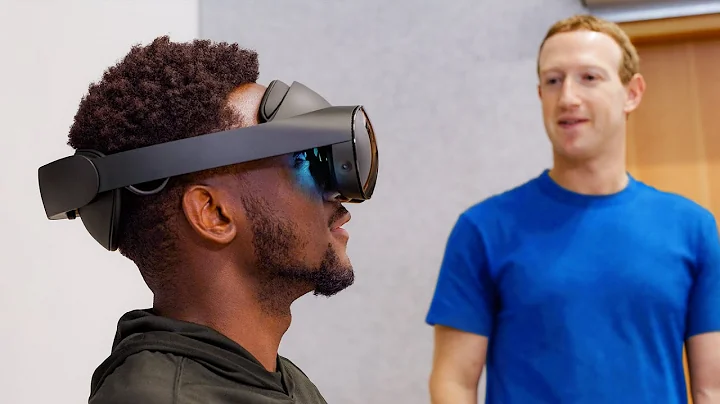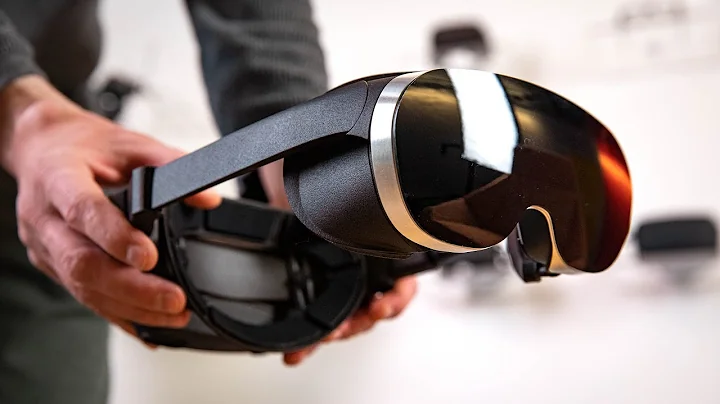
Mark Zuckerberg showed off a demo video of the company's unreleased "high-end" VR headset on his personal Facebook page today.
Unlike AR headsets such as HoloLens 2 and Magic Leap 2, Meta Cambria is a VR headset. The product, currently codenamed Project Cambria, was mosaicd in the video, but Zuckerberg showed off an " mixed reality " experience, with the new helmet's color camera showing penetrating video of the outside world. Simultaneously overlaying these visuals with a game-like experience (meaning the wearer can interact with virtual objects overlaid on the real-life environment). This technology has existed before, but in high-end professional headsets. I tried the Varjo XR- 3. This is a VR device equipped with lidar , which also integrates video data with VR to achieve surprisingly convincing AR effects). The mixed reality experience is built through Meta's Presence platform, which launched last fall.
The company has said it wants to use the device for experiences other than gaming, specifically for productivity, although this demo, titled "The World Beyond," is certainly more gaming in nature.

The company's $299 Quest 2 headset already has penetration cameras, but they can only capture grayscale images. Cambria's onboard sensor will capture full color, which should give users a more immersive experience. . This will also be aided by a dedicated depth sensor on the device, which should help the headset more accurately place digital content in the user's physical space.

There are still a lot of unresolved questions about the device, most specifically what "high-end" means in terms of price. Meta Corporation sells its VR products largely at a loss, but as it doubles down on and , it's unclear whether this is a long-term strategy. TheInfomation previously reported that the helmet would cost $799, but a Meta spokesperson said at the time that the price would be "significantly higher" than that.

Meta The company also released this two-and-a-half-minute video highlighting its Presence Platform, which shows the vast difference in experience between the Quest and Cambria headsets. Meta's CTO Andrew Bosworth wrote on Twitter that next week's SDK update will include "the full suite of Presence Platform tools powered by the Machine Perception and AI-Passthrough, Spatial Anchor, Scene, Interaction and Speech SDKs, as well as our recently updated Hand Tracking API". The
demo video mainly shows Zuckerberg gesturing to the cartoon character in this Oppy video and seemingly depicting its environment in the real world. It also includes clips from other Meta AR projects, and this video once again reminds users that you may be wearing one of these in the future to visit a virtual office environment and use augmented reality to work on your cloud workstation. Zuckerberg also hinted that it will be used for fitness (putting trainers in your room) and extended virtual displays for work.

By blending the real world into VR experiences, Meta is preparing the way for smarter headsets and eventually AR glasses.
The company will release The World Beyond to the public next week and will make the source code available to developers.
One of the first VR experiences to adopt these technologies was Horizon Workrooms, the company's VR collaboration software. The Studio app allows people to map their desks, bring real laptops into avatar-based VR meetings, and anchor virtual whiteboards into real-world environments. "We started working almost as a demo, combining a lot of technologies," Zuckerberg said. Over time, it became clear that the workshop was more than just a tech demo, and the company began offering it more broadly.
’s inclusion of see-through video is just the first step towards a more immersive mixed reality future. Equally important is object recognition; Meta didn't reveal any specific plans to bring object recognition to future helmets, but it could represent a huge shift for the technology.
Now, the Quest headset only knows that you are sitting at a table if you draw and mark that table. In the future, the headset might recognize both the table and the objects on it, seamlessly incorporating everything into the mixed reality experience.
Betting on VR, Even if Others Don't
"There's a group of people who think AR is going to be a big thing, but they don't quite believe in VR yet. It's very exciting to have that group of people join in," Zuckerberg said. . Skepticism about VR isn't just a phenomenon among developers; companies like Magic Leap have decided to focus on AR instead of VR, even if it means producing expensive devices that aren't suitable for consumer use. Zuckerberg believes this approach ignores existing consumer habits.
Zuckerberg said: "In the technology industry, we have this bias that we think mobile phones are really critical and TV is not. But the average American spends as much time on TV as on mobile phones, if not more." "Ultimately, VR headsets could become an immersive version of television, and AR glasses could be the mobile devices of the future, which is why Meta is investing in both.
Zuckerberg said: "Being able to ship some mainstream VR devices and build a developer community allows us to build a tool chain, a good community and a developer community before [glasses-like] AR devices even exist." Monetization tools.
Zuckerberg said mixed reality tools that allow developers to play in two worlds will allow them to prepare for this future. "That's the bet we're making," he said. "I might be Wrong. But so far, the data shows that VR is going to be pretty important. So I feel good about the path we're on."





















